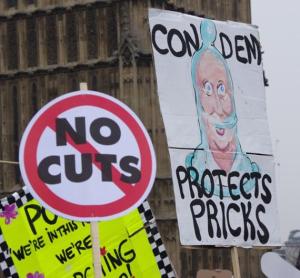The January issue of The Commune is now available. It features articles on the state of the anti-cuts movement after the 30th November pensions strikes, a plan for the NHS beyond both market and state, the uprising in Wukan, China, and much else besides.

The paper is free: click the image above to download the PDF. See below for a list of articles as they are posted online.
news
cops back bosses bullying cleaners – Siobhan Breathnach reports on Guildhall cleaners standing up against management bullying
wukan peasant victory sets stage for chinese turmoil – Adam Ford reports on the Wukan rebellion and asks what it means for the future of social struggles in China
reza shahabi must be free! – Omid Rezai looks at the case of a jailed militant on hunger strike in Iran
the woolf that didn’t bark: the LSE-libya inquiry – Jack Staunton, a student at the London School of Economics (LSE) looks at Lord Woolf’s inquiry into the School’s ties to the Gaddafi régime
thatcher and liverpool thirty years on – Adam Ford writes on revelations that the Thatcher Government discussed a ‘managed decline’ of Liverpool.
news in brief… – suicide threat at foxconn; la senza occupation; G4S asylum-seeker homes deal
anti-cuts
the n30 strike and a 2012 of struggle – Steve Ryan, a PCS activist in Wrexham, looks at the aftermath of the 30th November national pensions strike and the opportunities for struggle in 2012
faith in the government or unity on strike? – Clifford Biddulph comments on the GMB union’s announcement on the Government’s pensions deal in the wake of the 30th November strike
unions not up to the challenge – A Unison branch secretary replies to Clifford’s article
taking control of our struggle – A college worker who struck on 30th November reports on the mood in her workplace six weeks later
an alternative for the here and now – the editorial argues that communism isn’t just some dream for the future: it’s about how we organise today
working life
death by a thousand (paper) cuts – Taimour Lay reports on the crisis in the print-media from a journalist’s perspective
workers’ control in the health-care system – Mike Levine discusses how we can go beyond the hierarchical form of the National Health Service.
self-managed socialism: possible, urgent, necessary – Henrique T. Novaes looks at advantages and limitations of the Latin American experience of workers trying to overcome capitalist work relations through their control of their workplaces
distribution
This paper is free, and we’re always looking to expand our distribution network. Would you like to share these ideas with friends or colleagues? Leave a few in your local library or café? Contact us at uncaptiveminds@gmail.com
To get our communist message out there, we also need money. If you enjoy the paper, the price of a couple of pints a month would be of great use to us. Email us, or set up a standing order to The Commune, Co-op sc. 089299 ac. 65317440. You can also send cheques, addressed to ‘The Commune’, to The Commune, Freedom Bookshop, Angel Alley, 84b Whitechapel High St, London, E1 7QX











